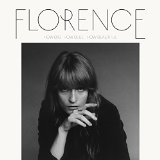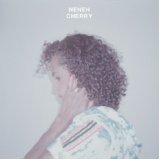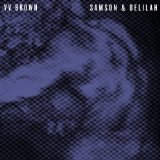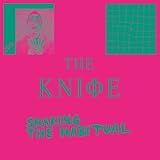 Florence + The Machine is a relatively rare and interesting type of multi-million selling global superstar to be found in this or even the past decade. She is more suited to the mid-eighties/nineties stretch of pop stars that included Kate Bush, Prince and Bjork – artists that used idiosyncratic and sometimes iconoclastic imagery that was key to their success but didn’t define it and whose music was frequently strange and brilliant but sold by the shed load. Where Florence Welch differs from her idols though is that her musical choices so far have found the singer already approaching what could be regarded as caricature of herself. Her debut album “Lungs” was a rag-tag but solid collection of goth-pop which established her eclectic eccentricity and 2011’s highly polished “Ceremonials” had some fantastic songs which were often marooned in a samey, shouty and exhaustingly one-note soundscape. “How Big, How Blue, How Beautiful” sees Florence set out to actively change this, to breath nuance and restraint and personal experiences into an album’s worth of songs.
Florence + The Machine is a relatively rare and interesting type of multi-million selling global superstar to be found in this or even the past decade. She is more suited to the mid-eighties/nineties stretch of pop stars that included Kate Bush, Prince and Bjork – artists that used idiosyncratic and sometimes iconoclastic imagery that was key to their success but didn’t define it and whose music was frequently strange and brilliant but sold by the shed load. Where Florence Welch differs from her idols though is that her musical choices so far have found the singer already approaching what could be regarded as caricature of herself. Her debut album “Lungs” was a rag-tag but solid collection of goth-pop which established her eclectic eccentricity and 2011’s highly polished “Ceremonials” had some fantastic songs which were often marooned in a samey, shouty and exhaustingly one-note soundscape. “How Big, How Blue, How Beautiful” sees Florence set out to actively change this, to breath nuance and restraint and personal experiences into an album’s worth of songs.
Markus Dravs has taken over almost all production duties from Paul Epworth (who still co-produces one track here) and has laid down the law, it seems, telling Welsh that certain well-worn subjects are off-limits, such as water metaphors (a few still slip through the net, excuse the pun) and an early song called “Which Witch” bought to him by Welch was rejected because of song title only (and that too still appears, but as a bonus track only). He wanted to put her voice up front and to be more exposed and vulnerable, less multi-tracked, and for the music to also have space to breathe. Will Gregory, the introvert half of Goldfrapp, was bought on board as Welch wanted lots of brass and she’s certainly got her wish. It seems that there was some compromise on both sides, as this is a different Florence album in part, but it is not to be considered as any real, radical departure in sound. With the strength of songwriting on display here and a successful transition to more interesting and diverse soundscapes this is not important, it’s the most balanced and cohesive album that Welch has made thus far.
The first song to be heard from “How Big, How Blue, How Beautiful” was the striking “What Kind of Man”. With Welch’s voice manipulated to echo that of Karin Andersson from The Knife, she sounds genderless and possessed and it’s something of a shame that guitars and drums crash in all too soon. The mania and panic associated with Welch and evidenced here again is offset beautifully by a return to the coolness of this initial refrain though and “Ship to Wreck”, with its soaring near gospel middle-eight, continues with the indie rock motifs . The title track’s opening line ‘between a crucifix and the Hollywood sign’ is not the only thing that sounds like you might hope a Madonna track would in 2015; it has a spaciness and warmth that is designed to be heart- swelling and it is. The long instrumental play-out is the most optimistic that a Florence track has ever sounded, assertive trumpets and forthright strings herald a new dawn with all of its possibilities. Sounds cheesy perhaps but it’s sincere and as gorgeous as hell.
“Various Storms & Saints” and “Long & Lost” continue with an acoustic, bare bones but lush instrumentation and “Caught” is a mid-tempo r’n’b song with an unexpected country sway and is swoonsomely heartbroken. Over a plaintive organ and understated orchestration it is “St Jude” which cements absolute melodic perfection with Welch’s forever fallen angel, compulsively drawn to chaos. “Delilah” and “Third Eye” will delight the Florence diehards with both tracks pulling across the established, bombastic and commercial sound from her previous two albums and turning the dial up even further to not-quite ludicrous settings. Album closer “Mother” incorporates all of these ingredients but stirs them about with a 1970’s blues-rocker shtick that creates something altogether more strange and the final, thrashing fifty seconds genuinely excite. Florence + The Machine may never be able to do subtle but with “How Big, How Blue, How Beautiful”, Welch has made considerable progress with making music that is more complex, satisfying and timeless sounding than before, never alienating her current fan base and undoubtedly attracting many more new ones in the process.
 I have a confession. It would be unreasonable and creatively and artistically crippling for her, but I want Neneh Cherry to make another “Buffalo Stance” and one more “Manchild” whilst she’s at it. These two songs, twenty five years old and counting, and her most famous along with Youssou N’Dour’s “Seven Seconds”, are as fantastic examples of perfect r’n’b, hip-hop pop as you will ever hear. Weird, joyous, melancholic and just gloriously sing-along tracks they instantly established Cherry as an artist that represented the period so completely that she has never been forgotten and as a female performer who embodied supreme self- possession and control over her image and her music. But therein of course lies a real truth in my confession and that it is built on nostalgia, sentimentality probably, and an opportunity to recapture something that probably can’t be and shouldn’t be. And Neneh Cherry has never been an artist to wallow or revisit, not for she the desperate and depressing revival tours and reality TV features so I wonder, when will my one pop wish ever come true?
I have a confession. It would be unreasonable and creatively and artistically crippling for her, but I want Neneh Cherry to make another “Buffalo Stance” and one more “Manchild” whilst she’s at it. These two songs, twenty five years old and counting, and her most famous along with Youssou N’Dour’s “Seven Seconds”, are as fantastic examples of perfect r’n’b, hip-hop pop as you will ever hear. Weird, joyous, melancholic and just gloriously sing-along tracks they instantly established Cherry as an artist that represented the period so completely that she has never been forgotten and as a female performer who embodied supreme self- possession and control over her image and her music. But therein of course lies a real truth in my confession and that it is built on nostalgia, sentimentality probably, and an opportunity to recapture something that probably can’t be and shouldn’t be. And Neneh Cherry has never been an artist to wallow or revisit, not for she the desperate and depressing revival tours and reality TV features so I wonder, when will my one pop wish ever come true?
2012’s “The Cherry Thing” was the last full length album to feature Cherry’s vocals on every track. It was a relatively specialist jazz album, wild and uninhibited but a sideline nonetheless. This, only her fourth album proper, has some of the residue of the itchy, structure-punishing, live feel of that last outing but where that album felt like an ensemble piece, which is what it was, this is all her; front, back and centre. “Blank Project”, a misleading title given its sharp focus, is very much about Neneh Cherry and her life now and the roles that she plays out, old and new. To get back to my confessional wish, there is not another “Buffalo Stance” here; of course there isn’t. There is however, amongst the avant-garde noises and sometimes bare sound stages, some bold and invigorating pop song structures. Surprisingly they are not to be found in the ponderous and strangely characterless duet with Cherry’s super groupie and number one fan Robyn on “Out of the Black” but in a trio of songs that appear in the album’s first half.
Following the reflective and protective “Across The Water”, a gentle and partly-rapped opener set to African percussion and stark patted drums, the title track “Blank Project” establishes Kieran (aka Four Tet) Heden’s production (he’s responsible for the whole album) style and sonic choices. Live drums, drum machines, guitars, pinging jangling ear-flinching percussion and a low frequency, vibrating and rubbery electronic bass that shares equal billing with only Cherry herself for persistence and aggravated attitude. Along with “Blank Project”, “Naked” and “Weightless” detail addictive/compulsive relationships, making peace with a world and culture that resists being grounded in anything other than the present and feelings of being overwhelmed by the pressure to carry on ‘as normal’.
‘Strip me naked and put me down right
Strips me naked, my wings need to blast off
Life is going faster, like a bus it runs me over
No kind of beacon, fill me up and make me whole now’
All of these songs have a rambunctious punk energy which link in with Cherry’s earlier time with Rip, Rig and Panic but also, like her best work, they have fantastic melodies and exuberant, big choruses. “Weightless” in particular has a massive charge swinging around a chorus that lists bad dancing, over-spending, hasty decisions and a desire for some kind of spiritual balance. Any of these songs could be performed by artists that are half the age of Cherry and who represent the more interesting end of r’n’b and dance hybrids such as Angel Haze, MIA, Sky Ferreira and even Lorde, which is testament not only to the influence that Cherry has had on modern music but also her refusal to conform to perceived notions of appropriateness.
“Spit Three Times”, a mid-tempo track that recalls Cherry’s dalliance with trip-hop around the mid 90’s, and, in particular the track ‘Feel It’, tackles depression but is not in itself a depressing track. Cherry’s warm and clear vocal also sounds suspicious of the superstitions that she thinks may help her dark mood at bay.
‘Monkeys on my back
Holding me down
Black dogs in the corner
Looking up at me
But you’re like an old friend or an enemy; holding me down’
“Dossier”, a definite standout track, has a truly sinister build and bipolar mood but ends up revealing nothing scarier than domesticity although maybe this is Cherry’s biggest fear? The one true ballad “422” sees Cherry joining her native Swedes with a glacial, melancholic electronica reminiscent of The Knife and the closing track “Everything”, which may be overlong at nearly eight minutes, is the most experimental track here calling to mind Yoko Ono, albeit at her most subdued. All of it though hanging together beautifully with a graceful and consistent temperament.
Neneh Cherry has always been more of a commentator than a player. Her views have come from her own perspective and experiences as a woman, a woman of colour, a hip-hop star, a pop star, a parent and a reluctant participant of the music industry. To use an overused and often incorrectly-applied phrase she is what you might call authentic. “Blank Project” feels like a concentrated version of Cherry in that she is so present throughout and her strength and vulnerability heightened. It’s as if you’ve spent the morning with her sharing pots of coffee whilst trying to disentangle problems and laughing hysterically at pretty much nothing together, and she’s just left. She’s still live in your head but she’s no longer present, such is the personal nature and intensity of these songs. I won’t deny that I would love to hear her produced by Pharrell or the new Beyonce whizz kid Boots just to hear what they would come up with; I think it would be amazing. But that’s not to belittle or underestimate the quality of this record. Neneh Cherry is back and her art and soul informs this project, blank only for you to fill the role of listener and to share the very human experiences expressed honestly, courageously, and often thrillingly throughout.
 London based indie electro brats New Young Pony Club are now just NYPC. The abbreviated name also reflects their reduction from a five-piece band to a duo; original members lead singer Tahita Bulmer and producer Andy Spence remain. They still sound like New Young Pony Club but this, their third album, is by some distance their most accomplished, musical and exciting to date. It seems that the trimming away of excess views and voices has bought about a new-found sonic richness and clarity with a welcomed ability to craft the kind of songs that you always hoped they would make but never quite managed to deliver.
London based indie electro brats New Young Pony Club are now just NYPC. The abbreviated name also reflects their reduction from a five-piece band to a duo; original members lead singer Tahita Bulmer and producer Andy Spence remain. They still sound like New Young Pony Club but this, their third album, is by some distance their most accomplished, musical and exciting to date. It seems that the trimming away of excess views and voices has bought about a new-found sonic richness and clarity with a welcomed ability to craft the kind of songs that you always hoped they would make but never quite managed to deliver.
The tough and tantalising opener, “Hard Knocks“, with its wonderfully disorganised lyrics (‘waiting for, hard knocks, the school of, I think you are) is instantly recognisable as the group due to its monotone, perpetually pissed off vocal, heard first in 2009’s omnipresent “Ice Cream”. On NYPC’s first single “You Used to Be a Man” which is a lesson in building, electro minimalism there are multiple harmonies throughout, a middle eight and a melody that will not want to leave your head willingly. ‘Do you understand how hard it is to stand and watch you fall hard?’ goes the cheeky, smartarse hook and although somewhat economic in structure it bears testament to how far their song writing skills have developed over five years.
“Sure As The Sun” has humour (‘last night we went to a model home, we thought it was love, it was just a mirage’) funky bass and sheets of electro parps, defining the point where Talking Heads and the Tom Tom Club merge. “I Came Through For You” has muted “Planet Rock” style drum machine booms and “Things Like You” relies on the staple Bulmer delivery before it shifts key and, along with Spence, a romantic and wistful, pure pop chorus unexpectedly emerges. Stand-out track “Now I’m Your Gun” with its seductive and assertive plucked synth chords and accordion appearance is sleek and precise. The beautiful and modern electronics, albeit inspired mainly by three decades worth of genre twisting artists and music, are expertly played and gleam throughout the album.
“Play Hard” with its hard-nosed, new wave guitar and vocals can be traced back to the B52’s first two completely essential and ground-breaking albums when Kate Pierson and Cindy Wilson sang about fish as gifts, dirty back roads and not dancing like cheese; weird and wilfully sexy. The final two minutes of “Everything Is” are pure snapping beats and steel drums which will undoubtedly bring to mind The Knife but NYPC have made something life-affirming and relatable as opposed to the overwhelming impenetrable coolness of the Stockholm duo’s “Shaking the Habitual” album from earlier this year. It’s sad that Bulmer and Spence won’t garner the same amount of media coverage and adulation. Only on the final track, “L.O.V.E.”, does the steam begin to run out and things start to plod but by this point it is easily overlooked.
At times it felt like New Young Pony Club were more part of an East London ‘fashion slash’ mob rather than a standalone, individual musical entity. Their debut was gimmicky and sounded only half-finished and the (surely) ironically titled “The Optimist” was heavy with something other than tunes and in retrospect the disharmony within the group at that time could have been responsible. NYPC, though, are the sound of artists finally snapping together the crucial matching and previously lost parts forming a new, perfect whole. Streamlined, efficient and pleasure-seeking, it’s a beautiful and intelligent thing.
 VV Brown’s second album opens with two songs that share Madonna titles but aren’t cover versions. “Substitute for Love” and “Nothing Really Matters” were two of the singles taken from the ultimate Madonna make-over album and mid-career return to form, 1998’s “Ray of Light”. Unhappy with the r’n’b follow up to “Bedtime Stories” (an r’n’b influenced collection itself), Madonna scrapped the entire sessions and hired electrohead, Brit, William Orbit, started calling herself Veronica Electronica and the rest is pop cultural history. Albeit on an entirely different scale, VV Brown has followed Madonna’s lead. About to release her follow up to the successful but underwhelming “Travelling at the Speed of Light” debut, Brown decided the hip hop and r’n’b-dominated follow up, a departure indeed from the nostalgic pop doo-wop of her debut, was not authentic and she walked away from the project and the album was never released. Two years on and as many career changes later she has returned with eleven angry, desolate and soulful songs set against a unsettling, uncompromising soundtrack and it is a startling reinvention indeed.
VV Brown’s second album opens with two songs that share Madonna titles but aren’t cover versions. “Substitute for Love” and “Nothing Really Matters” were two of the singles taken from the ultimate Madonna make-over album and mid-career return to form, 1998’s “Ray of Light”. Unhappy with the r’n’b follow up to “Bedtime Stories” (an r’n’b influenced collection itself), Madonna scrapped the entire sessions and hired electrohead, Brit, William Orbit, started calling herself Veronica Electronica and the rest is pop cultural history. Albeit on an entirely different scale, VV Brown has followed Madonna’s lead. About to release her follow up to the successful but underwhelming “Travelling at the Speed of Light” debut, Brown decided the hip hop and r’n’b-dominated follow up, a departure indeed from the nostalgic pop doo-wop of her debut, was not authentic and she walked away from the project and the album was never released. Two years on and as many career changes later she has returned with eleven angry, desolate and soulful songs set against a unsettling, uncompromising soundtrack and it is a startling reinvention indeed.
Samson & Delilah is released on VV Brown’s own YOY record label so it can assumed that this is what she wants to sound like now with little or no interference from outside parties, and that is remarkable. The aforementioned “Substitute For Love” opens in much the same way as the Madonna track opens “Ray of Light”, gently twinkling notes and ambient synths introduce Brown’s incredible voice which is now several tones lower; a contralto to rival Grace Jones and she sounds magnificent throughout. A dominant all-electronic backing that is somewhere between The Knife circa “Silent Shout” and Massive Attack at their most austere ( think “Sly”) with a mound of sticky dubstep coating the astounding, warrior-like, “Igneous”. It isn’t easy listening and the mood is pitch-black; a couple of songs like the title track can struggle to stand out when the melody is forsaken for a mood but these are minor niggles.
“The Apple”, by some distance the most instant and accessible track here, sounds amazing. Its rolling, funking electro pop assertiveness is magical and Brown has huge fun with the relentless put-downs that lyrically dominate: ‘Don’t testify me, don’t bring me down, don’t hold me captive, you’re not the apple of my eye you see’. “Nothing Really Matter” is a swirling, sombre and sharp-edged synth monster which would have sounded at home on Adult’s last album, VV Brown never before having hinted at this unlikely and inspired direction.
“Faith”, track eight of eleven, finally allows a chink of light to spill through and is more lifting sonically and melodically than anything preceding it. A duet with an uncredited male, it quietly references George Michael and with its theme of rebirth (‘I shake it off as I fall down to the ground, I belly flop into a swimming pool of sound, so you got to have faith’ ) and hope and a melody that will stick for days, it’s one of the strongest and most soulful songs here. “Ghosts”, in which Brown’s vocals spectacularly morph into 80’s singer songwriter Joan Armatrading, continues with similar themes and benefits from some simple but brilliantly constructed vocal effects over a droning organ and tight drum machines.
The album ends with two tracks which bring to mind a singer/songwriter who is now an almost-cliched reference point for artists and music fans alike. I’m loath to point out the similarities in the songwriting between that of the haunting “Knife” and Kate Bush’s “This Woman’s Work” and the foggy, suffocating album closer “Beginning”, which sounds like a lost track from Bush’s “Ninth Wave” concept album which formed the second part of ‘Hounds of Love’. These aren’t parodies though, as is often the case, they are very well crafted compositions from an artist who may or may not be familiar with Bush’s work (I suspect the former) and to draw such genuine comparisons is a compliment indeed.
“Samson & Delilah” never goes too far, gets too crazy or attention-seeking. The measured and meticulous tone and pacing of this album is a very large part of its success. VV Brown will have her work cut out for her when it comes to the initial promotion of this admittedly difficult album (for such a visual artist she has made the odd decision to hardly feature in the videos for the first two singles) and many will not make the connection between the Marks and Spencer model and former pop star and Brown’s current, definitive form. Twelve months down the line though, and many people will have hopefully been exposed to this album while having no idea who the artist is and it will become so something of a word-of-mouth slow burner. By any standards, this is a heartfelt and bold collection and a testament to VV Brown’s self belief.
 I suppose this is a pretty highbrow album or piece of work. It references the philosopher Foucault, authors Jeanette Winterson and Margaret Atwood and apparently its themes are gender, queer politics, capitalism and environmentalism. This in itself is not a problem and sounds like it should be pretty thrilling, dynamic experience but on the whole it’s not obvious from listening to Swedish electronic duo The Knife’s fourth album what this album is about, if that, in fact, is even important. When half of the tracks are instrumental as is the case here then it’s more about a mood or a feeling being conveyed through the music without a dependency on lyrical explanations and admittedly there are some ugly, challenging and uncomfortable sounds present but not many that you would not want to listen to more than 2 or 3 times at the very most. And music, unlike film for the majority at least, is surely made for repeated listens so it’s maybe not a coincidence that half of this album does sound like a score, a soundtrack to a probably not very good film, with a dystopian theme maybe. I just don’t really get it, or maybe I should come clean and say I just don’t really like it.
I suppose this is a pretty highbrow album or piece of work. It references the philosopher Foucault, authors Jeanette Winterson and Margaret Atwood and apparently its themes are gender, queer politics, capitalism and environmentalism. This in itself is not a problem and sounds like it should be pretty thrilling, dynamic experience but on the whole it’s not obvious from listening to Swedish electronic duo The Knife’s fourth album what this album is about, if that, in fact, is even important. When half of the tracks are instrumental as is the case here then it’s more about a mood or a feeling being conveyed through the music without a dependency on lyrical explanations and admittedly there are some ugly, challenging and uncomfortable sounds present but not many that you would not want to listen to more than 2 or 3 times at the very most. And music, unlike film for the majority at least, is surely made for repeated listens so it’s maybe not a coincidence that half of this album does sound like a score, a soundtrack to a probably not very good film, with a dystopian theme maybe. I just don’t really get it, or maybe I should come clean and say I just don’t really like it.
I have loved The Knife, I do love The Knife. “Deep Cuts”, their second album, is a brilliant, pioneering album that was so influential that elements of their sound began to seep into the mainstream and it still sounds weird, silly, political yes, but completely accessible and relevant today. Its follow up, “Silent Shout”, was more linear and cohesive and much darker and it cemented one of those very rare things; The Knife had developed their own sound that was as much about song writing as it was about vocals; often distorted, and a sonic landscape which was nightmarish often but consistently beautiful and intricate. It was instantly recognisable, as them. At the core were the songs though, the melodies, and they were beautiful and sad like “Marble House” and you can sing along to “Heartbeats” or the elegant ‘Pass This On’ and this is where “Shaking The Habitual” differs from their previous work; there are no real tunes here, nothing that you can easily connect to.
‘A Tooth For An Eye’ misleads as the opening track, it tricks you with its relative simplicity and traditional song structure and on the big pounding, tribal drums of “Wrap Your Arms Around Me” there is an imperial, dangerous mood created; if these 2 tracks had been a teaser for the album I would be extremely excited about what’s potentially to come. The first 5 minutes of “Raging Lung” do pretty much the same thing and are very good but the following 4 minutes drag and drone on and make the whole thing a chore. On the lead single “Full of Fire”, all ten minutes of it, which is highly rhythmic and percussive dance music for people who don’t (or can’t) dance Karin Dreijer Andersson bemoans ‘liberals giving me a nerve itch’ and by the time the seagull noises come in around the 4 minute mark and there’s still 6 minutes to go I can completely relate. On the final 20 seconds of the track though my favourite pop cultural reference on the album appears, far more low-brow than the others; Salt ‘n’ Pepa’s ‘Let’s Talk About Sex’, changed here to ‘let’s talk about gender baby, let’s talk about you and me’; brilliant and effective. And there are flickers of brilliance in this track and repeated listens really do pay off, there is in fact a musical riff and lyrically it’s pretty funny and interesting but I’m just not sure how many people will bother to put the effort in.
The 20 minute “Old Dreams Waiting to Be Realised” which is bare, ambient electronic, is just so very, very boring; surely this wasn’t the siblings’ intention? To make something that would soundtrack an art exhibition or installation but is ultimately background music? “Fracking Fluid Injection” is obviously, from the title, making a political statement although I’m not sure how and to who exactly? No one will get to the end of this track, with its ten minutes of sawing noises and some screeching who isn’t already a fan and doesn’t already shares the band’s beliefs. So what’s the point? It is in no way pleasurable to listen to; it grates and aggravates. The final track “Ready to Lose” is excellent; it isn’t much of a progression musically from “Silent Shout” or “Fever Ray”, Andersson’s solo project, but it sounds magnificent and it makes it point.
Many people will consider this album to an important, revolutionary piece of work but it’s ultimately narrow and pretentious in the worst possible sense when it could and should have been exhilarating, difficult and addictive. I am deeply suspicious of the many reviewers who will heap superlatives onto this album but who are unlikely to listen to it again, not because they don’t have the time but because they have no desire too. Don’t alienate the people you could be entertaining and maybe, possibly, educating too, although this is almost always too much to ask.


